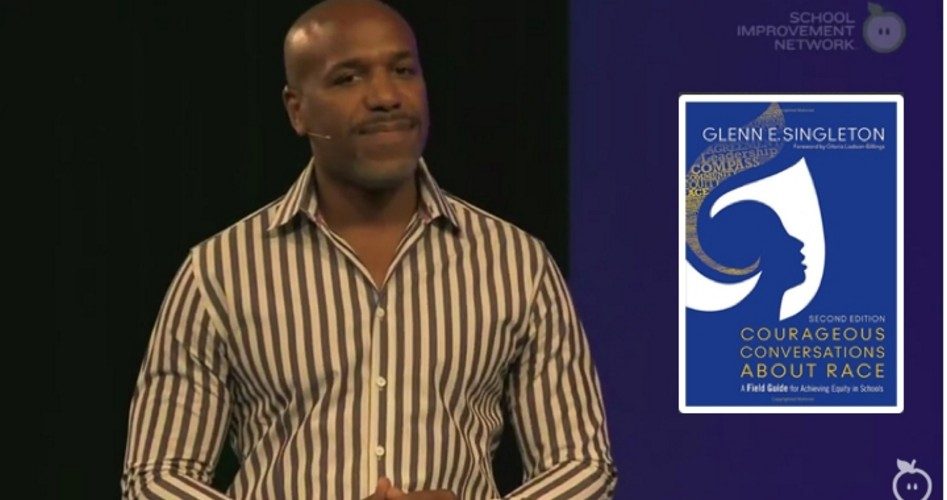
Got privilege? Because if you’ve got the rap, rationalizations, and rhetoric to bloviate about “white privilege,” you can make millions. Glenn Singleton (shown) sure has.
Singleton, a black man, is the founder of Pacific Educational Group (PEG), which has made millions of dollars teaching “white privilege” peppered with Marxist dogma to America’s schoolteachers. PEG’s ostensible goal is to improve the education of blacks and other minorities. But central to its program is that blacks are held down by “white privilege,” the notion that the educational system and wider society are infused with white-supremacy-spawned “white norms” and thus handicap black and Hispanic kids. And what are these norms? Hard work, planning for the future, and punctuality are among them. And black norms? PEG cites one as being “collectivism.”
And PEG has been collecting cash for quite a while. The group was founded in 1992; in 2002, Seattle, Washington, endured embarrassment and financial costs after losing a court case inspired by its PEG-influenced racial curriculum. Yet school systems are still shelling out the big bucks for the group’s snake oil. As EAG News’ Steven Gunn wrote yesterday, “Eighteen school districts reported paying PEG a combined $1.56 million in … [2014-2015]. Seven of those districts paid the company six figures.” Gunn provided the list:
• Lawrence, Kansas — $125,575
• Osseo, Minnesota — $208,800
• Bellevue, Washington — $153,600
• Pittsburgh, Pennsylvania — $123,324
• Baltimore County, Maryland — $138,930
• Corvallis, Oregon — $105,055
• St. Paul, Minnesota — $369,828
In addition, Gunn reports that PEG boasts a total of 183 districts on its client list, which means it could be quite the capitalist endeavor, indeed.
And for this money it certainly delivers — the leftist dogma. As the Competitive Enterprise Institute’s Hans Bader wrote in 2007 in reference to the Seattle schools:
They hired him [Singleton] to indoctrinate their students and staff about racism. As a result, they redefined racism consistent with Singleton’s extreme and radical beliefs. The Seattle Schools defined “individualism” as a form of “cultural racism,” said that only whites can be racist, and claimed that planning ahead (“future time orientation”) is a white characteristic that it is racist to expect minorities to exhibit.
Singleton promotes the basest racial stereotypes, such as claiming that “’white talk’ is ‘verbal, impersonal, intellectual’ and ‘task-oriented,’ while ‘color commentary’ is ‘nonverbal, personal, emotional’ and ‘process-oriented.’” He also blathers about “the ubiquity of white privilege and racism,” and depicts Asian students as being “majority students” just like whites because they have the temerity to succeed academically in a predominantly white society. But although he views minority culture as not being “intellectual” and “task-oriented,” it is white teachers whom he blames for the underperformance of many minority students, since he claims it would be a “racist statement” to place any responsibility for minority underperformance on minorities themselves.
One white teacher PEG obviously approves of is Professor Antonia Darder, as she was a keynote speaker at the organization’s 2009 Summit for Courageous Conversations. Holder of a “Chair of Ethics and Moral Leadership” at Loyola Marymount University, she “once gave a speech entitled ‘The Neoliberal Restructuring of Cities, Education Policy, and Possibilities for Social Transformation Through a Marxist Lens,’” reports Gunn. He continued, “‘We must remove the blinders and see capitalism as the generator of scarcity,’ she wrote in The Critical Pedagogy Reader. ‘Seldom do we find with the resounding praises paid to technology a discussion of how technology revolutions have exposed the wretchedness of capitalism — millions of people dying from starvation alongside unprecedented wealth.’”
Not to be outdone was another speaker at the PEG event, Gloria Ladson-Billings, a professor at the University of Wisconsin-Madison. She once wrote about teaching black students and “sociopolitical critique,” “This aspect of culturally relevant teaching links it closely with a critical pedagogy that argues for students and teachers alike to participate in a collective struggle.”
Picking up this Bolshevik baton at the 2013 PEG summit was speaker Sonia Nieto, a professor at the University of Massachusetts Amherst. She wrote in one of her books that “questions about equity and social justice are at the core of education. As such, education is always a political undertaking,” Gunn relates.
Lastly Gunn tells us, “Another speaker at the 2013 conference was educator and author Lisa Delpit. According to an article published by The Nation, Delpit is known for ‘introducing math concepts through problems with cultural resonance for disadvantaged kids, such as calculating the probability that the police will stop-and-frisk a black male, as compared to a white male.’”
How about the probability that a black child will be successful when accosted by PEG’s pedagogy? Helping with this calculation is EAG News’ Ben Velderman, who wrote in 2012:
PEG says concepts like hard work and planning for the future are traits of “white culture,” and implies that minority students cannot be expected to respond to a curriculum based on those values. They say black culture is more in tune with “collectivism,” presumably the type applied in Cuba or North Korea.
… The Pacific Educational Group makes no secret that its prescription for closing the achievement gap is based on the Critical Race Theory, which argues that … things must be made unequal in order to compensate for the nation’s innate racism.
… The minority cultures, according to PEG, value “color group collectivism.” This entails “fostering interdependence” and group success, shared property, learning through social relationships, and making life choices based on “what will be best for the family” or the group.
Velderman also tells us that a “2008 seminar PEG conducted for the Minneapolis school district quoted extensively from the book ‘Bridging Cultures, Between Home and School,’” which purports to be able to instruct teachers on how to connect with minority students and parents. “This is done by [helping] ‘school personnel to understand and accept a collectivistic value perspective…,’ according to the book,” reports Velderman.
To this, there is a sad and tragic irony. Decades ago already, black educators and parents would often try to blunt the social pressure exerted on good black students by other black students — driven by jealousy — who impugned the former for “acting white.” It’s doubtful these concerned adults ever dreamt of a day when so-called scholars would give this notion the imprimatur of academic authority.
And “white values”? How would the Chinese and Japanese view the notion that punctuality, industriousness, future-planning, and task-orientation are white values? As an insult? As an interesting sidenote, on PEG’s website it shows PEG’s executives, most of whom are not only black, but have advanced degrees — one wonders if they showed up for class to get those degrees. If they could do it, why can’t other black kids?
And what kind of a service is PEG doing for black and Hispanic youth? In a 2014 piece entitled “It’s Time to Quit Operating on C.P. [Colored People’s] Time,” black journalist T.J. Holmes writes about his black community, “‘You know how we are.’ … Our challenges with starting or arriving on time are often dismissed with humorous complacency…. But this week, CPT totally stopped being funny to me.” And rightly so. Accomplished and successful people the world over — whether in Beijing, Benoki, Bangalore, or Bangor — tend to share certain qualities, such as punctuality, industriousness, perseverance, and task-orientation. Casting such things as “white,” and thus encouraging their opposites in black youth, is something one might expect from the KKK.
It’s said, “Ninety percent of success is just showing up.” But if PEG keeps showing up at America’s schools, you can kiss increased minority success goodbye.



